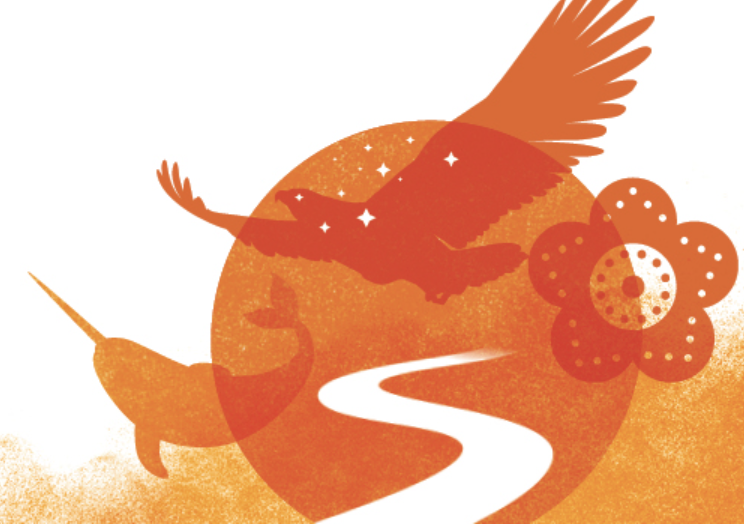Truth and Reconciliation Day – Michael Etherington
“We call upon the federal government, in collaboration with Aboriginal peoples, to establish a statutory holiday, a National Day for Truth and Reconciliation to honour Survivors, their families, and communities and ensure that public commemoration of the history and legacy of residential schools remains a vital component of the reconciliation process." This is one of the 94 Truth and Reconciliation Calls to Action, one of only 12 that have been fulfilled. Though Canada still has a long way to go, Truth and Reconciliation is a start to what will hopefully be a way toward change.
Michael Etherington was a guest speaker during our assembly on Truth and Reconciliation Day. During this assembly, Michael spoke on what Truth and Reconciliation means to him, as well as his perspective on making Canada a more unified country. We had the privilege of sitting down with Michael after the assembly to ask him some questions on Truth and Reconciliation, and how to make a difference within our community. He brought up how in Toronto, we are often disconnected from issues in more rural communities, which is particularly important to consider when reflecting on Truth and Reconciliation. In order to be more unified as a country, we need to consider issues from perspectives other than our own, as members of a more urban environment. He also spoke on how to make a change within our community and on a larger scale, as well as inspiration for the song which he released.
Claire: Today is National Truth and Reconciliation Day. How do you think we can become more mindful year-round and not just today?
Michael: Well, the distinction on the personal journey, but how that can apply to shifting culture like there’s a societal, cultural shift that’s occurring, and so I think what’s important is being mindful and establishing pathways of respect and recognition. So, what’s happening right now is a lot of Indigenous community members get disregarded- ed, and so do their needs, more importantly, their prioritized needs, and I think an important consideration is bridging the gap between the urban and remote. So right now, you have a lot of issues that are in remote communities. So, try and think about how we in an urban space can create that bridge.
Alison: Speaking of how you became an activist, what inspired you initially to do this type of work?
Michael: I actually don’t refer to myself as an “activist.” My grandfather told me (when I was actually around your age), he said you’re going to hear a lot of “-ists” and “-isms” growing up, like “activism”, and “activist”, but he referred to them as self-appointed titles. He thought it would create an internal conflict with yourself because what you’re attributing is that in our culture, it is important that you’re developing things where your titles are earned by your people. If you haven’t done the necessary steps to get a respected title, it creates a sense of ego. So, what’s important is that we talk about what it means to be a Grassroots Person. For me, that’s why I shared the talk, that I wanted to maintain my dignity as a community member who has a platform in the voice that I’m sharing. Be mindful about how you navigate your title, because it is going to be attributed to who you are, and that’s how people will recognize you.
Claire: As a person who works on these issues, what brings you strength and inspires you on a daily basis?
Michael: Well, I think for me, it’s just knowing that there are so many people and community members’ stories that when I speak to audiences like you, that you don’t see. So, those people I always think about in my work. People, family members that may not be here anymore. I have a long-term vision about what I want to see, I meet so many Indigenous peoples and I say “you know reconciliation?” and people say, that’s a farce, that’s a joke. They don’t believe in it, but they’re within their own pocket of community because if you talk to people who think like you, you’re going to create more of a core, maybe even a deeper-rooted connection to what you think. But what’s happening now, is that we’ve got to take it out of these blocks, and start finding ways to build connections with people – that’s an important value for the reconciliation- is how do you go above that step to build connections?
Claire: Do you have any advice that you’d like to share for young people or just people in general that want to make a change?
Michael: I would say what ‘ve been learning now is to be able to look at yourself in the mirror and say “Who are you?”, “What do I represent?” Being self-reflective and being honest with yourself. Also, what really helped my work is that if you have people that don’t agree with you, being able to listen to them. So like, hearing different perspectives to enrich your worldview. So, validate what they’re sharing to you; what that’s going to do, is that it’s going to make you a stronger person.
Michael: As an IB school, think globally. The market that we have of our connectivity is globalised. It’s going to really enrich your life today, moving forward if you’re able to find all the variances and respect other cultures, respecting other ways of knowing and understanding, and ultimately knowing how to manage and navigate conflict. A lot of people don’t know how to do that. When conflict arises, relationships cease. So that’s the next step I would say.
